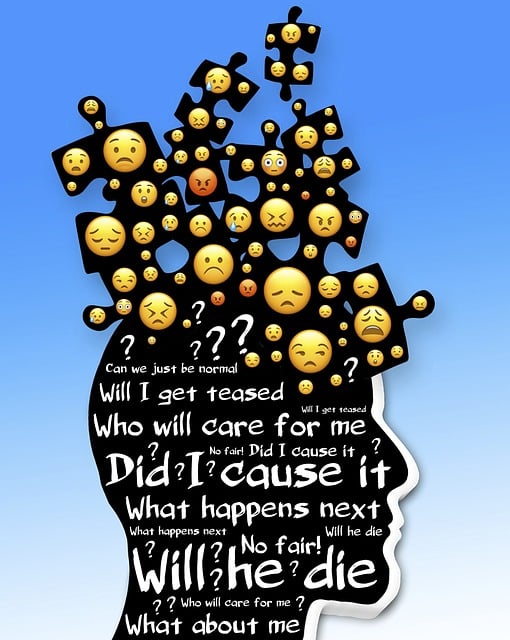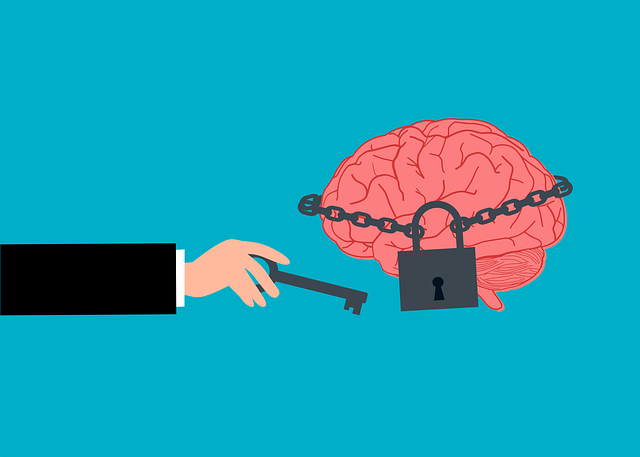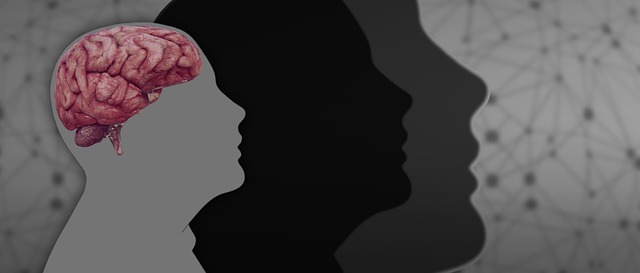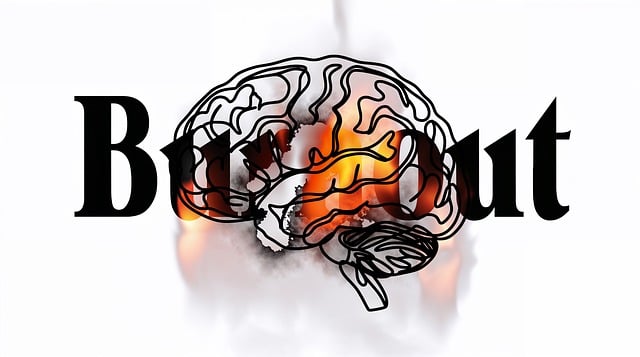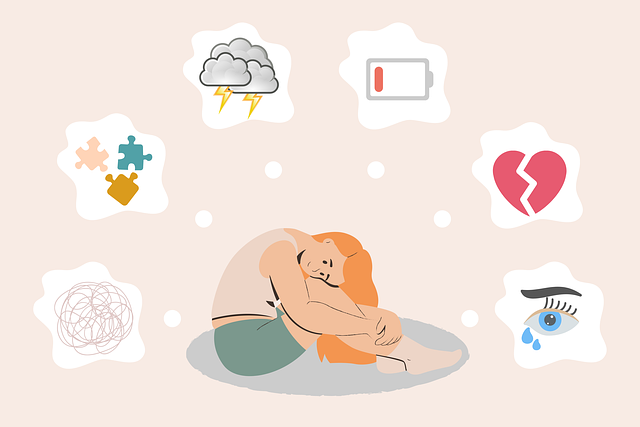Understanding mood regulation is key in treating Dissociative Disorder in young children, who often use it as a coping mechanism after trauma. Early recognition of symptoms like behavior shifts and emotional imbalance is critical. Therapy focuses on creating safe, supportive environments where children learn to identify and express feelings through evidence-based practices such as play therapy, cognitive behavioral therapy (CBT), mindfulness, and creative outlets. Structured sessions in CBT teach them to recognize emotions, understand triggers, and manage reactions effectively. Mindfulness practices help develop present-moment awareness and emotional regulation skills. Creative therapies offer powerful expressions for internal experiences and emotional release. Creating stable, structured, and culturally sensitive environments at home and school is vital, with consistent routines, clear boundaries, dedicated calming spaces, Mental Wellness Coaching Programs, and inclusive learning environments. Advocacy for comprehensive Mental Health Policy ensures priority on student well-being, integrating these approaches to effectively treat Therapy for Young Children Dissociative Disorder.
Mood regulation strategies are essential tools for young children, especially those dealing with dissociative disorders. This article explores various therapeutic approaches designed to help kids manage their emotions effectively. We delve into Cognitive Behavioral Therapy (CBT) as a powerful tool, mindfulness practices for present-moment awareness, creative outlets like art and music as expressions of therapy, and the importance of building supportive environments at home and school. Understanding dissociative disorder in young children is crucial for implementing these strategies successfully.
- Understanding Mood Regulation and Dissociative Disorder in Young Children
- Cognitive Behavioral Therapy (CBT): A Powerful Tool for Managing Emotions
- Mindfulness Practices to Enhance Present-Moment Awareness
- Creative Outlets: Art, Music, and Play as Therapeutic Expressions
- Building a Supportive Environment at Home and School
Understanding Mood Regulation and Dissociative Disorder in Young Children

Understanding Mood regulation is crucial in addressing Dissociative Disorder in young children. This complex mental health issue often presents as a coping mechanism for kids who have experienced trauma, leading to a disconnect from their emotions and sense of self. Recognizing symptoms early on, such as sudden shifts in behavior or difficulty maintaining emotional balance, is key for professionals. Therapy for Young Children with Dissociative Disorder focuses on creating a safe, supportive environment where they can learn to recognize and express their feelings effectively.
Through evidence-based practices like play therapy and cognitive behavioral therapy (CBT), children develop Emotional Intelligence, enabling them to understand and manage their emotions. Risk Assessment for Mental Health Professionals is essential to ensure the child receives appropriate care tailored to their unique needs. Self-Care Practices for therapists are also vital, as they must maintain a stable and empathetic approach to effectively guide young clients through their healing journey.
Cognitive Behavioral Therapy (CBT): A Powerful Tool for Managing Emotions

Cognitive Behavioral Therapy (CBT) is a highly effective tool in managing and regulating emotions, particularly for young children dealing with dissociative disorders. This form of therapy focuses on identifying and changing negative thought patterns and behaviors that contribute to emotional distress. By teaching children to recognize and challenge distorted thinking, CBT empowers them to develop healthier coping mechanisms. Through structured sessions, children learn to understand their emotions, gain insights into triggers, and acquire skills to effectively manage their reactions, leading to improved mood regulation.
For mental health professionals, incorporating CBT practices into their risk management planning can significantly enhance patient outcomes. This approach is not only beneficial for young clients but also serves as a powerful strategy in burnout prevention for healthcare providers. By fostering mind over matter principles, therapists support individuals in taking control of their emotional well-being, reducing the reliance on unhealthy coping mechanisms.
Mindfulness Practices to Enhance Present-Moment Awareness

Mindfulness practices have emerged as a powerful tool for enhancing present-moment awareness and regulating emotions, which can be particularly beneficial for young children dealing with dissociative disorders. Through mindfulness therapy, kids learn to focus on their senses and observe their thoughts and feelings without judgment. This simple yet profound practice helps them develop resilience and coping skills, allowing them to navigate their emotional landscapes more effectively.
Incorporating mindfulness into therapy sessions for young children with dissociative disorders can facilitate social skills training by promoting self-awareness and empathy. By staying grounded in the present, these children gain a better understanding of their own emotions and those of others, fostering healthier interactions and relationships. This approach not only aids in mood regulation but also contributes to overall well-being and personal growth.
Creative Outlets: Art, Music, and Play as Therapeutic Expressions

Engaging in creative outlets like art, music, and play can serve as powerful therapeutic expressions for young children with dissociative disorders. These activities provide a safe and non-threatening way for them to explore and process their emotions, helping to regulate mood and reduce symptoms of dissociation. For instance, art therapy allows children to externalize their internal experiences through colors, shapes, and textures, while music can facilitate emotional expression and enhance relaxation.
Through these creative mediums, children can gain a sense of control and mastery over their emotional states. Participatory arts and music workshops, facilitated by trained professionals, offer structured yet flexible environments where young individuals can learn effective stress management techniques and crisis intervention guidance. Incorporating these activities into therapeutic routines can significantly contribute to overall mood management and the development of adaptive coping skills for children with dissociative disorders.
Building a Supportive Environment at Home and School

Creating a stable and supportive environment is paramount for young children’s mental wellness, especially those navigating dissociative disorders. At home, consistent routines and structured boundaries can significantly aid in mood regulation. Parents or caregivers can employ simple techniques like establishing fixed meal times, regular bedtimes, and clear rules to provide a sense of predictability. A dedicated space for relaxation or calming activities, such as reading or art therapy, can also offer a safe haven during moments of distress. Schools play a crucial role in fostering mental health through initiatives like Mental Wellness Coaching Programs Development, ensuring teachers are equipped to recognize and support students’ emotional needs.
Cultural sensitivity in mental healthcare practice is essential here. Recognizing and respecting diverse cultural backgrounds and incorporating traditional healing methods, when appropriate, can make therapy for young children with dissociative disorders more effective. Moreover, advocating for comprehensive Mental Health Policy Analysis and Advocacy ensures that educational institutions prioritize the well-being of their students, creating an inclusive and supportive learning environment.
Mood regulation strategies are essential tools for nurturing young children’s emotional well-being, especially those with dissociative disorders. By combining cognitive behavioral therapy (CBT), mindfulness practices, creative outlets, and supportive environments, parents and educators can effectively manage and enhance children’s emotional resilience. These holistic approaches not only address symptoms but also foster a sense of stability and self-awareness in young minds, paving the way for a brighter future. Implement these strategies to revolutionize therapy for dissociative disorder in young children.





